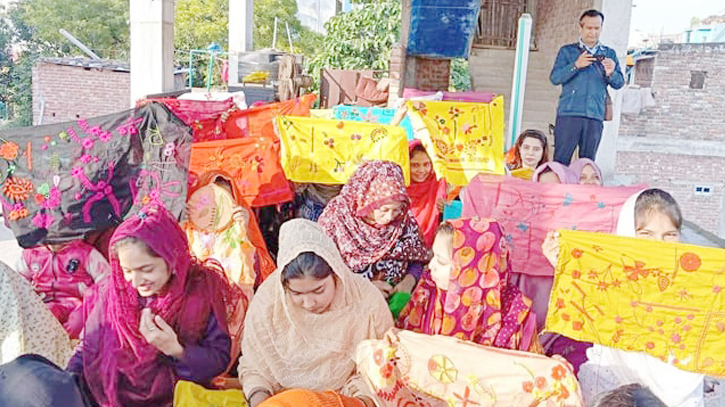
Photo: Collected
Many underprivileged and distressed women have become self-reliant through various income-generating activities, particularly working in boutique and embroidery houses and livestock, in the region contributing a lot to society.
With this breakthrough, women's participation in economic activities is gradually mounting. The participation of rural women is also significant.
"Raziya Sultana, 35, of the city's Dharampur Bazekazla earns around Taka 450-550 per day after making and selling cloth bags for shopping and now she is on the afoot to say goodbye to her long-lasting poverty and hunger," said a local community leader.
Uroshi Mahfila Fateha is now a successful entrepreneur in Rajshahi city. But the success didn't come overnight as she had to cross many hurdles to attain it. For its recognition, she received the Joyeeta Award in Rajshahi.
Uroshi, a resident of Upashahar area, says her journey towards becoming an entrepreneur was not smooth.
"After passing HSC in 2006, I got admitted to the Department of Fine Arts at Rajshahi University and side by side with regular study, I started drawing works on saree in house. I got a huge response from the people that increased the demand for my works," she said.
Uroshi embarked on her venture after purchasing necessary inputs at a cost of Taka 2,000. Now, she owns a big commercial organization.
"My products are also being exported and I also provided jobs to 20 women on a monthly payment system," she said.
Uroshi is taking herself and others forward by depending on her strong mental strength and willpower. As many as 1000 other women are now working in her organisation on a daily wage system.
Thirty skilled women are working in Niloy-Osman Motor Industries Limited alongside 172 male workers at BSCIC Industrial Estate, said Mahmudun Nabi, administrative officer of the factory.
"We have founded 'Angona Boutique and Fashion' and it's being operated by our Angana Mohila Samity successfully making more than 100 women income-generators," said IffatAra, director of the samity.
Similarly, Daudpur Mohila Kalyan Samity is running Shefali Boutique, and Mohona Mohila Kalyan Samity's Mohona Boutiques transformed at least 175 other women self-reliant.
"We have engaged around 50 women in skill development training for their livelihood," said Anwara Begum, president of Dashmari Distressed Women Welfare Association.
After completing their training, the beneficiary women are doing block, boutique and embroidery works in their respective areas, and many of them attained their long-cherished economic emancipation.
Anwara Begum told the media that the boutique houses were established and are being operated with the assistance of the District Women Affairs Office.
Ummaton Begum, 43, of Ganpara CDC, has become a successful grocery shop owner as she pays monthly installment of Taka 7,350 against her credit of Taka 70,000 regularly through operating her shop besides leading her four-member family.
At present, Jahanara of Baganpara is owner of an auto-rickshaw and enabled herself to bring out from the vicious cycle of poverty. Locals Selina and Sonabhan also stated a similar success story.
Sabnam Shirin, Deputy Director of the Department of Women Affairs, said they are imparting training to the unemployed women on various trades like modern tailoring and embroidery, mobile phone servicing, beautification, food processing and packaging and shopping bag preparation in order to improve their living and livelihood conditions.
"We provided grants to the Volunteer Women Organizations (VWOs)," she said, adding each of the organizations arranges awareness and life-skill development training in their own training centre for women regularly involving them various post-training income-generation activities for their self-reliance.
The VWO members were imparted training on leadership and managerial skill development so that they can make their organizations more effective and dynamic.
Another project titled "Women Skill-based Training for Livelihood" is also being implemented with the main thrust of making the underprivileged and neglected women especially divorcee, widow and financially backward self-reliant.
Under the project, the targeted women are provided three-month training. They are also given financial and some other requisite support after training.
Sabnam Shirin told that they are very much positive to involve the socially backward women in the country's overall development process and the beneficiary women are becoming self-reliant.
Sharing views on the issue, Kalpona Roy, the local unit president of Bangladesh Mohila Parishad, said supporting skill development of the poor women in the society for better economic conditions is very important.
More emphasis should be given to help the women to earn additional income and reduce vulnerabilities by making market work better for the poor women.
Messenger/Fameema








